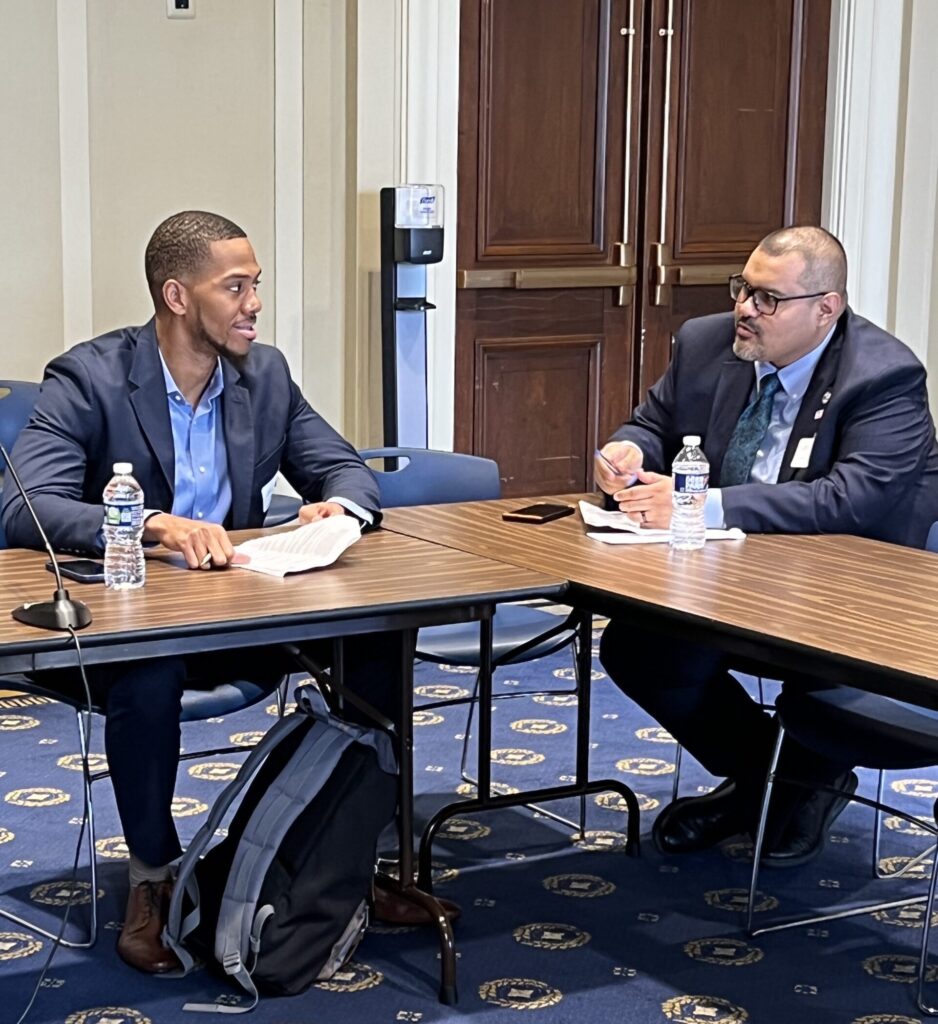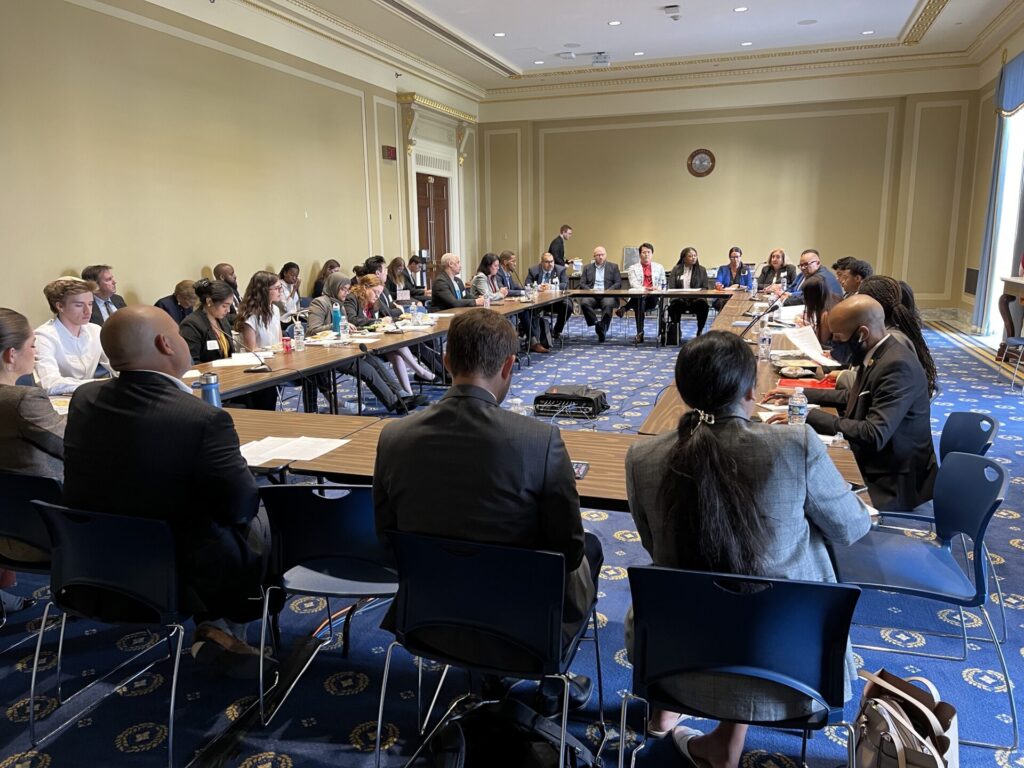
On Tuesday, September 13, 2022, the Council for Opportunity in Education and Vera Institute for Justice hosted a briefing entitled “Educational Access and Support Services for incarcerated and Formerly Incarcerated Individuals” on Capitol Hill.
Hosted by the offices of Senators Jack Reed (D-RI) and Brian Schatz (D-HI) and Representatives Gwen Moore (D-WI) and Warren Davidson (R-OH), attendees included congressional staff, administrators from the Department of Education, and individuals from the organization around Washington, D.C., who work to expand educational opportunities. This interactive session was moderated by Kayla James, who serves as the Senior Program Associate at the Vera Institute for Justice.
The briefing was motivated, in part, by the pending restoration of Pell Grant availability to incarcerated individuals beginning in July 2023. Created by the FAFSA Simplification Act, Pell Grant restoration will provide opportunities for justice-impacted students to secure well-paying jobs, find stable housing, provide for their families, and reintegrate into their communities when they leave prison. During the briefing, presenters shared that, in addition to this critical financial aid, in order to ensure successful enrollment and completion, students will also need access to vital support services, such as those provided by the federally funded TRIO programs.
“We at the Department of Ed are working diligently to support incarcerated and formerly incarcerated students as we are approaching full Pell restoration next summer,” said Amy Lloyd, Assistant Secretary for the Office of Career, Technical and Adult Education for the U.S. Department of Education. Lloyd provided the opening remarks at the briefing and expressed her excitement about having the conversation and engaging fellow leaders in working together toward shared goals.
The federal government recognizes that low-income, first-generation, and students with disabilities face more than financial barriers partially addressed by Pell Grants. TRIO programs address non-financial barriers such as a lack of information and understanding of processes, inadequate academic preparation, or limited family and peer support for college. Three existing TRIO Programs – Educational Opportunity Centers (EOC), Veterans Upward Bound (VUB), and Student Support Services (SSS) – provide support services for incarcerated and formerly incarcerated individuals.

The Educational Opportunity Centers program provides counseling and information on college admissions to qualified adults who want to enter or continue a secondary or post-secondary education program. Veterans Upward Bound ensures that veterans receive all the benefits they qualify for and that any coursework they completed in the military is recognized; it also provides assessment and enhancement of essential skills through counseling, mentoring, tutoring, and instruction in the core subject areas. Student Support Services helps college students by providing academic advising, tutoring, and personal and career counseling.
Founder and director of the Reentry Campus Program and EOC alumnus James Monteiro spoke about his first encounter with EOC and the importance of having a support system that encourages and recognizes participants’ potential. “The first time I was introduced to the possibility of going back to school, I was on my way to the library, and a lady from EOC called me over and asked did I ever think about going back to school, and that planted a seed for me. A seed of hope.”
Several members of the panel, including Cris Fanning, Director of Education, Kansas Department of Corrections, Rodney White from the Virginia Department of Corrections, and Terrell Blount from the Formerly Incarcerated College Graduates Network, detailed specific needs for success in working with justice-impacted students. These include “niche technology,” resources for students with incarcerated parents, changes to the FASFA and more representation of incarcerated persons working for organizations that specialize in educational access and support as solutions to those challenges.
While the needs for supporting justice-impacted students are many, so, too, are the opportunities.
Many of the challenges faced by incarcerated students mirror those faced by other students; however, these challenges are exacerbated and more concentrated in prison. Many have had poor prior education experiences, have accumulated debts in past attempts to complete college, and have few resources to help with any part of the process. It is challenging for incarcerated people to communicate with anyone outside, nor do they have equal access to the internet to obtain information or complete documents that are now almost exclusively available online.
Seventy percent of all jobs in 2027 will require post-secondary education and training beyond high school. Yet, only 11 percent of incarcerated people in state prisons and 24 percent in federal prisons currently meet this requirement. College is a primary avenue for upward mobility—especially among people of color, who disproportionately make up the prison population. Given this, postsecondary programs during or after prison provide people with knowledge, skills, and connections they can share with their children and families, multiplying the impact of a single college degree while reducing recidivism rates. Prisons with post-secondary education programs have fewer violent incidents than prisons without them, creating safer working conditions for staff and safer living environments for incarcerated people.
While Llyod stated, “over the last five years, we are honored to partner in serving almost 30,000 students to access Pell Grants to pursue post-secondary education while in prison. Over 9,000 students have earned an associate degree, a bachelor’s degree, or a certificate or diploma, and we want to celebrate those successes and build on them as we look ahead to Pell restoration.”
COE President Maureen Hoyler concluded the briefing with a charge for members of congressional offices that are “deeply committed to providing more opportunities to incarcerated or formerly incarcerated individuals” to be a champion of advancing policy on the topic while reminding attendees that this is a bipartisan issue. Hoyler said, “this is something we can make progress on, and COE is committed, Vera is committed, the Department of Education is committed, and the Administration is committed, so we’ve got to take the opportunities when they are available.”
This briefing helps start a dialogue between formerly incarcerated individuals, representatives from the correctional system, and congressional leaders about how TRIO programs and higher education policy has – and can continue to – advance educational opportunities for justice-impacted individuals.
For more information about the Vera Institute, visit vera.org.